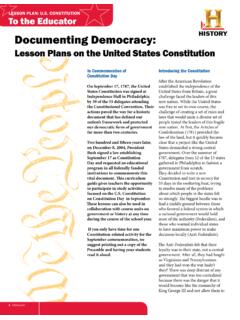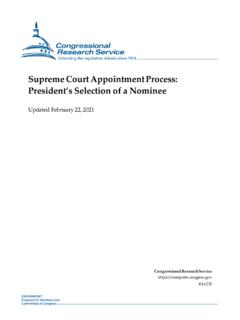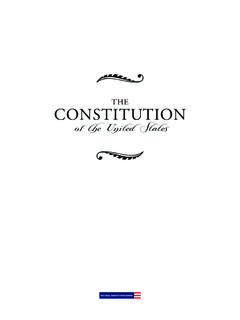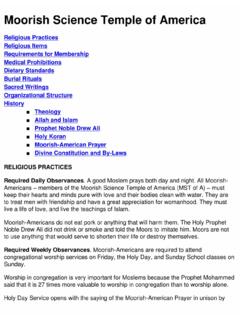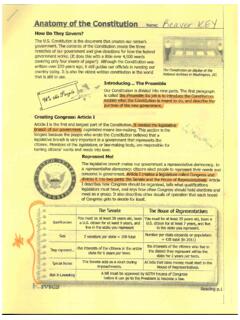Transcription of The Ten Commandments A Study Guide - Always Reformed
1 The Ten Commandments A Study Guide 2006. by Tim Black Table of Contents 2. The 1st 7. The 2nd The 3rd 20. The 4th Commandment, Part 1: Reason & Passage 25. The 4th Commandment, Part 2: Passage Survey & 32. The 5th The 6th The 7th The 8th The 9th The 10th How to Apply the 10 Commandments in Difficult 1. Introduction Why Study the Ten Commandments ? I. The Law is Useful! Three Uses of the Law i. For all men: Reveals God's holiness & man's duty and sin WLC 95. a) Lev. 11:44-45: Be holy as I am holy. the Unregenerate: Drive them to Christ - WLC 96. a) Gal. 3:24: So then, the law was our guardian until Christ came, in order that we might be justified by faith. the Regenerate: Rule of their obedience - WLC 97.
2 A) Titus 2:11-14: 11 For the grace of God has appeared, bringing salvation for all people, 12. training us to renounce ungodliness and worldly passions, and to live self-controlled, upright, and godly lives in the present age, 13 waiting for our blessed hope, the appearing of the glory of our great God and Savior Jesus Christ, 14 who gave himself for us to redeem us from all lawlessness and to purify for himself a people for his own possession who are zealous for good works. b) James 1:25: But the one who looks into the perfect law, the law of liberty, and perseveres, being no hearer who forgets but a doer who acts, he will be blessed in his doing. not useful for us to earn our justification Law & Gospel i.
3 Rom. 3:20-22: 20 For by works of the law no human being will be justified in his sight. 21 But now the righteousness of God has been manifested apart from the law, although the Law and the Prophets bear witness to it- 22 the righteousness of God through faith in Jesus Christ for all who believe.. Law is a great blessing Psalm 19. words do you associate with the word law? . punishment rules disobedience crime higher authority police court discipline jail used very different words than these in Psalm 19! 7 The law of the LORD is perfect, converting the soul;. The testimony of the LORD is sure, making wise the simple;. 8 The statutes of the LORD are right, rejoicing the heart;. The commandment of the LORD is pure, enlightening the eyes.
4 9 The fear of the LORD is clean, enduring forever;. The judgments of the LORD are true and righteous altogether. 10 More to be desired are they than gold, Yea, than much fine gold;. Sweeter also than honey and the honeycomb. 11 Moreover by them Your servant is warned, And in keeping them there is great reward. 2. What Are the Ten Commandments ? I. The Ten Commandments are the Covenant are the Mosaic Covenant i. Deut. 4:13: So He declared to you His covenant which He commanded you to perform, that is, the Ten Commandments ; and He wrote them on two tablets of stone.. ii. Deut. 5:2-3, 5ff: 2 The LORD our God made a covenant with us at Horeb. 3 The LORD did not make this covenant with our fathers, but with us, with all those of us alive here today.
5 5 ..He said, 6 'I am the LORD your God who brought you out of the land of Egypt, out of the house of slavery. 7 'You shall have no other gods before 9:9 : When I went up to the mountain to receive the tablets of stone, the tablets of the covenant which the LORD had made with are the Covenant of Grace i. Because the covenant formula I am the LORD your God and I will be your God, and You will be my people used to introduce this covenant (Ex. 20:2) is applied equally to the New Covenant. a) The formula in God's name Yahweh: Ex. 3:6, 11 (who am I?), 14 (I AM WHO I AM). b)The formula is applied equally to the OC & NC people of God, because those two peoples are one and the same: Ex. 19:5-6; Dt.
6 7:6-11 (1 Pet. 2:9-10); Ex. 20:2. c) Both forms of the formula are conjoined in scripture; they express the goal of the Exodus: Lev. 26:12-13: 12 I will also walk among you and be your God, and you shall be My people. 13 I am the LORD your God, who brought you out of the land of Egypt so that you would not be their slaves, and I broke the bars of your yoke and made you walk erect. d)The Mosaic covenant is God's remembering (and thus the extension of) His covenant with Abraham, which is broadly recognized to be the covenant of grace: Ex. 6:2-7. e) The formula is applied to the New Covenant in Ezek. 36:25-28 and: Jer. 31:33: But this is the covenant which I will make with the house of Israel after those days,".
7 Declares the LORD, I will put My law within them and on their heart I will write it; and I will be their God, and they shall be My people. 2 Cor. 6:16: Or what agreement has the temple of God with idols? For we are the temple of the living God; just as God said, "I WILL DWELL IN THEM AND WALK AMONG THEM; AND I. WILL BE THEIR GOD, AND THEY SHALL BE MY PEOPLE. Rev. 21:3: And I heard a loud voice from the throne saying, "Behold, the dwelling place of God is with man. He will dwell with them, and they will be his people, and God himself will be with them as their God. are our covenant! They follow the pattern of its structure, and define our obligations within it of the Commandments in History by God i.
8 Given to Moses and the people on Mt. Sinai in Horeb (Dt. 1:6; Ex. 20). by Moses i. Moses taught them to the people in Horeb, during their wandering in the desert (Dt. 4:5. happened throughout the text of Numbers), and at the edge of the promised land in the body of Deuteronomy (6-26). in Scripture i. They are the covenant God made in Horeb and reconfirmed in Moab. As such the 10. 3. Commandments are the central verbal expression of the covenant-relationship established at the climax of God's deliverance of His people from Egypt, and reconfirmed in preparation for their entrance into the land He had promised. This is why they are placed at the climax of the story in Exodus, and made the principial structure of the torah-teaching of Deuteronomy (cf.)
9 Olson, 1994: 6-22). They draw together, then, the main themes of the Pentateuch, and lay the foundation for Israel's life in Canaan under Joshua, the judges, David, and the prophets. This covenant then formed the foundational structure of and pedagogue leading to (Gal. 3:24) the New Covenant under Christ. Distinctions: The Moral Law is Summarized in, but more universal than, the Ten Commandments distinction in the Shorter Catechism: i. WSC 40: The rule which God at first revealed to man for his obedience was the moral law. ii. WSC 41: The moral law is summarily comprehended in the ten Commandments . the Westminster Confession: One covenant of grace, the same in substance, in two dispensations i.
10 : This covenant was differently administered in the time of the law, and in the time of the gospel ii. : There are not therefore two covenants of grace, differing in substance, but one and the same, under various dispensations. : The moral law doth forever bind all, as well justified persons as others, to the obedience thereof : Neither are the forementioned uses of the law contrary to the grace of the gospel, but do sweetly comply with it & Differentia in the Dispensations of the Moral Law i. Moral & Symbolic: Augustine, Theonomy , Civil, Ceremonial: Thomas Aquinas, Melanchthon, Calvin, WCF , (universally applicable) & Case Law (situationally-applied). Talionis & Pedagogical Delegation of Divine Justice a) The delegation (Ezekiel 23:24) is pedagogical (Ezek.


